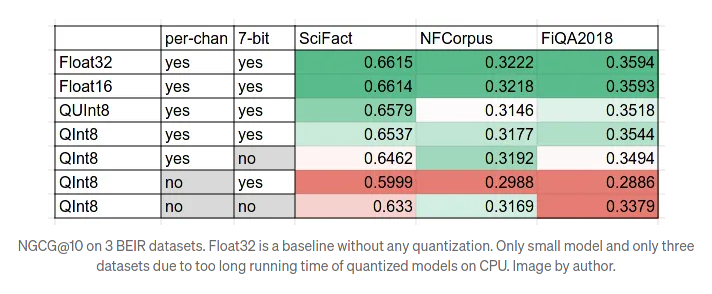Supported embedding models¶
Nixiesearch uses ONNXRuntime to support the vast majority of embedding models you can see on the MTEB leaderboard.
Huggingface model handles¶
You can reference any HF model handle in the inference block, for example:
inference:
embedding:
# Used for semantic retrieval
e5-small:
model: nixiesearch/e5-small-v2-onnx
prompt:
doc: "passage: "
query: "query: "
schema:
<index-name>:
fields:
desc:
type: text
search:
type: semantic
model: e5-small
Optionally you can define which particular ONNX file to load, for example the QInt8 quantized one:
inference:
embedding:
# Used for semantic retrieval
e5-small:
model: nixiesearch/e5-small-v2-onnx
file: model_opt2_QInt8.onnx
prompt:
doc: "passage: "
query: "query: "
schema:
<index-name>:
fields:
desc:
type: text
search:
type: semantic
model: e5-small
Converted models¶
We have a set of models converted to ONNX with the nixiesearch/onnx-convert tool available on our Huggingface repo at huggingface.co/nixiesearch:
- nixiesearch/e5-base-v2-onnx: ONNX opset 17, optimized, QInt8 quantization
- nixiesearch/e5-small-v2-onnx: ONNX opset 17, optimized, QInt8 quantization
- nixiesearch/e5-large-v2-onnx: ONNX opset 17, optimized, QInt8 quantization
And multilingual ones:
- nixiesearch/e5-base-v2-onnx: ONNX opset 17, optimized, QInt8 quantization
- nixiesearch/e5-small-v2-onnx: ONNX opset 17, optimized, QInt8 quantization
- nixiesearch/e5-large-v2-onnx: ONNX opset 17, optimized, QInt8 quantization
Check out the article in the blog on embedding performance and quantization for more details: How to compute LLM embeddings 3X faster with model quantization. The main executive summary is that quantized models are up to 3x faster than regular ones:

You should expect a small drop in ranking quality:

Converting your own model¶
You can use the nixiesearch/onnx-convert to convert yur own model:
python convert.py --model_id intfloat/multilingual-e5-large --optimize 2 --quantize QInt8
Conversion config: ConversionArguments(model_id='intfloat/multilingual-e5-base', quantize='QInt8', output_parent_dir='./models/', task='sentence-similarity', opset=None, device='cpu', skip_validation=False, per_channel=True, reduce_range=True, optimize=2)
Exporting model to ONNX
Framework not specified. Using pt to export to ONNX.
Using the export variant default. Available variants are:
- default: The default ONNX variant.
Using framework PyTorch: 2.1.0+cu121
Overriding 1 configuration item(s)
- use_cache -> False
Post-processing the exported models...
Deduplicating shared (tied) weights...
Validating ONNX model models/intfloat/multilingual-e5-base/model.onnx...
-[✓] ONNX model output names match reference model (last_hidden_state)
- Validating ONNX Model output "last_hidden_state":
-[✓] (2, 16, 768) matches (2, 16, 768)
-[✓] all values close (atol: 0.0001)
The ONNX export succeeded and the exported model was saved at: models/intfloat/multilingual-e5-base
Export done
Processing model file ./models/intfloat/multilingual-e5-base/model.onnx
ONNX model loaded
Optimizing model with level=2
Optimization done, quantizing to QInt8